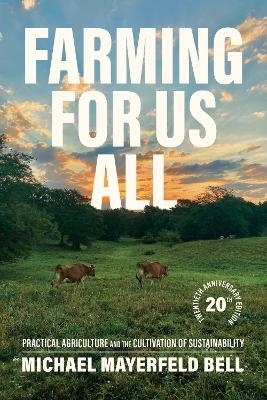
Farming for Us All
Practical Agriculture and the Cultivation of Sustainability
Seiten
2024
|
Twentieth Anniversary Edition
Pennsylvania State University Press (Verlag)
978-0-271-09748-0 (ISBN)
Pennsylvania State University Press (Verlag)
978-0-271-09748-0 (ISBN)
Climate change. Habitat loss. Soil erosion. Groundwater depletion. Toxins in our food. Inhumane treatment of farm animals. Increasing farm worker exploitation. Hunger and malnutrition in the midst of plenty. What will it take for farmers in the United States to embrace sustainable practices?
Michael Mayerfeld Bell’s Farming for Us All first tackled this question twenty years ago, providing crucial insight into how the structure of US agriculture created this situation and exploring, by contrast, the practices of farmers who are working together to radically change how they think, learn, and grow. This updated edition of his now-classic work reflects on the lessons learned over the past two decades.
Constrained by an oppressive nexus of markets, regulations, subsidies, and technology, farmers find themselves undermining their own economic and social security as well as the security of the land. Bell turns to Practical Farmers of Iowa (PFI), that state’s largest sustainable-agriculture group. He traces how PFI creates an agriculture that engages others—farmers, researchers, officials, and consumers—in a common conversation about what agriculture could look like. Through dialogue, PFI members crossbreed knowledge, discovering pragmatic solutions to help crops grow in ways that sustain families, communities, societies, economies, and environments.
Farming for Us All makes the case that for sustainable farming to flourish, new social relations are as important to cultivate as new crops. This book is necessary—and hopeful—reading for anyone concerned about the present and future of food and farming.
Michael Mayerfeld Bell’s Farming for Us All first tackled this question twenty years ago, providing crucial insight into how the structure of US agriculture created this situation and exploring, by contrast, the practices of farmers who are working together to radically change how they think, learn, and grow. This updated edition of his now-classic work reflects on the lessons learned over the past two decades.
Constrained by an oppressive nexus of markets, regulations, subsidies, and technology, farmers find themselves undermining their own economic and social security as well as the security of the land. Bell turns to Practical Farmers of Iowa (PFI), that state’s largest sustainable-agriculture group. He traces how PFI creates an agriculture that engages others—farmers, researchers, officials, and consumers—in a common conversation about what agriculture could look like. Through dialogue, PFI members crossbreed knowledge, discovering pragmatic solutions to help crops grow in ways that sustain families, communities, societies, economies, and environments.
Farming for Us All makes the case that for sustainable farming to flourish, new social relations are as important to cultivate as new crops. This book is necessary—and hopeful—reading for anyone concerned about the present and future of food and farming.
Michael Mayerfeld Bell is Philip David Lowe Professor and Vilas Distinguished Achievement Professor of Community and Environmental Sociology at University of Wisconsin-Madison He is the author or editor of eleven books, including, most recently, The Cambridge Handbook of Environmental Sociology, An Invitation to Environmental Sociology (now in its sixth edition), and City of the Good: Nature, Religion, and the Ancient Search for What Is Right.
| Erscheinungsdatum | 06.03.2024 |
|---|---|
| Zusatzinfo | 3 Charts; 26 Halftones, black and white |
| Verlagsort | University Park |
| Sprache | englisch |
| Maße | 156 x 235 mm |
| Gewicht | 476 g |
| Themenwelt | Naturwissenschaften ► Biologie ► Ökologie / Naturschutz |
| Sozialwissenschaften ► Politik / Verwaltung ► Staat / Verwaltung | |
| Sozialwissenschaften ► Soziologie | |
| Weitere Fachgebiete ► Land- / Forstwirtschaft / Fischerei | |
| ISBN-10 | 0-271-09748-5 / 0271097485 |
| ISBN-13 | 978-0-271-09748-0 / 9780271097480 |
| Zustand | Neuware |
| Haben Sie eine Frage zum Produkt? |
Mehr entdecken
aus dem Bereich
aus dem Bereich


